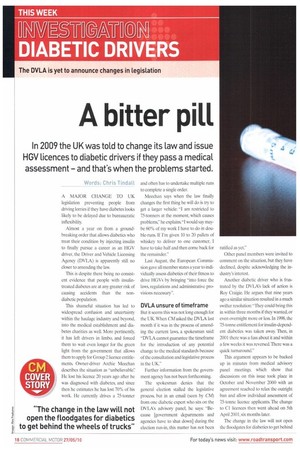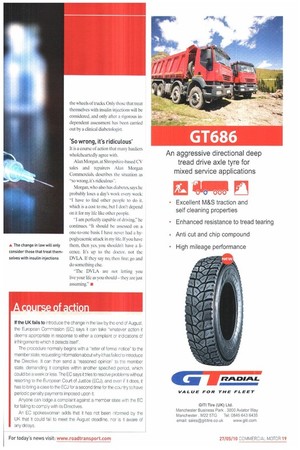A bitter pill
Page 18

Page 19

If you've noticed an error in this article please click here to report it so we can fix it.
In 2009 the UK was told to change its law and issue HGV licences to diabetic drivers if they pass a medical assessment and that's when the problems started.
Words: Chris Tindatt
A MAJOR CHANGE TO UK legislation preventing people from driving lorries if they have diabetes looks likely to be delayed due to bureaucratic inflexibility.
Almost a year on from a groundbreaking order that allows diabetics who treat their condition by injecting insulin to finally pursue a career as an HGV driver, the Driver and Vehicle Licensing Agency (DVLA) is apparently still no closer to amending the law.
This is despite there being no consistent evidence that people with insulintreated diabetes are at any greater risk of causing accidents than the nondiabetic population.
This shameful situation has led to widespread confusion and uncertainty within the haulage industry and beyond, into the medical establishment and diabetes charities as well. More pertinently, it has left drivers in limbo, and forced them to wait even longer for the green light from the government that allows them to apply for Group 2 licence entitlements. Owner-driver Archie Meechan describes the situation as "unbelievable' He lost his licence 20 years ago after he was diagnosed with diabetes, and since then he estimates he has lost 70% of his work. He currently drives a 7.5-tormer and often has to undertake multiple runs to complete a single order.
Meechan says when the law finally changes the first thing he will do is try to get a larger vehicle: "I am restricted to 7.5-tonners at the moment, which causes problems," he explains. "I would say maybe 60% of my work I have to do in double-runs. If I'm given 10 to 20 pallets of whiskey to deliver to one customer, I have to take half and then come back for the remainder."
Last August. the European Commission gave all member states a year to individually assess diabetics of their fitness to drive HGVs by bringing "into force the laws, regulations and administrative provisions necessary".
DVLA unsure of timeframe But it seems this was not long enough for the UK. When CMasked the DVLA last month if it was in the process of amending the current laws, a spokesman said: "DVLA cannot guarantee the timeframe for the introduction of any potential change to the medical standards because of the consultation and legislative process in the UK."
Further information from the government agency has not been forthcoming.
The spokesman denies that the general election stalled the legislative process, but in an email (seen by CM) from one diabetic expert who sits on the DVLA's advisory panel, he says: "Because [government departments and agencies have to shut down] during the election run-in, this matter has not been ratified as yet."
Other panel members were invited to comment on the situation, but they have declined, despite acknowledging the industry's interest.
Another diabetic driver who is frustrated by the DVLA's lack of action is Roy Craigie. He argues that nine years ago a similar situation resulted in a much swifter resolution: They could bring this in within three months if they wanted, or even overnight more or less. In 1998, the 7.5-tonne entitlement for insulin-dependent diabetics was taken away. Then, in 2001 there was a fuss about it and within a few weeks it was reversed. There was a quick turnaround."
This argument appears to be backed up in minutes from medical advisory panel meetings, which show that discussions on this issue took place in October and November 2000 with an agreement reached to relax the outright ban and allow individual assessment of 7.5-tonne licence applicants:Me change to Cl licences then went ahead on 5th April 2001, six months later.
The change in the law will not open the floodgates for diabetics to get behind the wheels of trucks. Only those that treat themselves with insulin injections will be considered, and only after a rigorous independent assessment has been carried out by a clinical diabetologist.
'So wrong, it's ridiculous'
It is a course of action that many hauliers wholeheartedly agree with.
Alan Morgan, at Shropshire-based CV sales and repairers Alan Morgan Commercials, describes the situation as "so wrong, it's ridiculous'.
Morgan, who also has diabetes, says he probably loses a day's work every week: "I have to find other people to do it. which is a cost to me, but I don't depend on it for my life like other people.
"I am perfectly capable of driving," he continues. "It should be assessed on a one-to-one basis. I have never had a hy poglycaemic attack in my life. If you have them, then yes, you shouldn't have a li cence. It's up to the doctor, not the DVLA. If they say no, then fine; go and do something else.
"The DVLA are not letting you live your life as you should — they are just assuming." •
































































































































